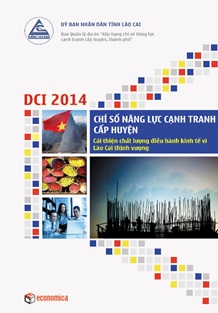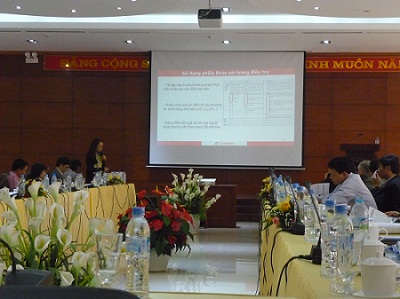
Lao Cai has launched different initiatives in order to further improve its governance quality and also to maintain the positive results achieved in the previous years.

One of the initiatives is to assess the economic governance and the improvement of the business environment at district level. Inspired by PCI, the province decided to evaluate the governance quality of district local authority by using District Competitiveness Index (DCI). The project is the first of its kind ever being implemented in Vietnam.
The project is composed of 3 phases: Phase 1 (2013): Develop the methodology and the index DCI, propose the tentative implementation schedule and activities for next phases; Phase 2 (2014-2015): Using the developed DCI for a pilot survey in nine districts of Lao Cai Province to finalize the index and give experimentally ranking result of districts in Lao Cai province; Phase 3 (2016-2020): Conduct annual DCI survey and officially announce the DCI results in the period 2016-2020.


Economica Vietnam, thanks to its expertise and experience in economic governance, survey, PCI, have been entrusted by the People’s Committee of Lao Cai to support the province in developing the methodology for the DCI and implementing the first-ever District Competitiveness Index of Lao Cai.
After the methodology was developed and approved by the People’s Committee of Lao Cai, survey and analysis work for the development of the Lao Cai DCI report was initated in 2014. 10,447 businesses (enterprises, household business, cooperatives) nine districts were divided into smaller groups called strata. There were a total of 15 stratum in each district based on the type of business establishment (business household, cooperative, enterprise), the economic segment (agriculture, natural resource exploitation, manufacturing, construction, and service & commerce). A number of population units were randomly drawn in each strata to constitute the DCI sample. This sampling method (often known as stratified random sampling) enabled Economica Vietnam to create a sample of 862 observations in total for the purpose of DCI survey. The face-to-face interviews were then conducted. This interviews were carried out by more than 50 local interviewers in the second half of 2014.
This whole process was conducted in close cooperation with the Lao Cai Statistics Office.
To date, the report on Lao Cai District Competitiveness Index has been completed with ranking of the 9 districts in the province being finalized and analysis of economic governance in the districts being done. The report has been submitted to the People’s Committee of Lao Cai.
In the coming time, Economica Vietnam will continue to work closely with the People’s Committee of Lao Cai and the province DCI Project Management Unit to implement the next phases of the project with the objective of contributing further to the improvement of economic governance in the province.
| The District Competitiveness Index (DCI) in Lao Cai is a composite index used to measure and assess different areas in local economic governance and the improvement of business environment. The index is developed to reflect the most important dimensions of economic governance at district level.
It is designed in a manner that can give hints and suggestions to district government authorities to take actions to improve their governance and to improve the business and investment climate at the district level. Especially, the sub-indicators are developped in a way that is as self-explanatory as possible so local district authority can look at the report and know how to take actions without having to do much further analysis (which is often costly and time-consuming).
It is composed of 8 sub-indexes: Entry cost, Land Access and Security of Tenure, Transparency, Informal Charges, Pro-activity of government leaders, Business Support Services, One-stop Shop, and Tax procedures. The results of sub-indexes will be the basis for calculating DCI overall scores.
|
 Final evaluations of two ILO projects on social and unemployment insurance (21/01/2015)
Final evaluations of two ILO projects on social and unemployment insurance (21/01/2015)
 Execution of ADB TA for Strengthening Microfinance Sector (08/12/2014)
Execution of ADB TA for Strengthening Microfinance Sector (08/12/2014)
 Development of the M&E Framework for the MPI - WB Inclusive Innovation Project (24/08/2014)
Development of the M&E Framework for the MPI - WB Inclusive Innovation Project (24/08/2014)
 Support to DICA Myanmar in Process Mapping, Reforms and Capacity Building (24/08/2014)
Support to DICA Myanmar in Process Mapping, Reforms and Capacity Building (24/08/2014)
 Documentation of the “Developing Business with Rural Poor in Cao Bang” (22/06/2014)
Documentation of the “Developing Business with Rural Poor in Cao Bang” (22/06/2014)
 Effective Business Associations for Dynamic and Inclusive Growth in Vietnam (05/05/2014)
Effective Business Associations for Dynamic and Inclusive Growth in Vietnam (05/05/2014)
 Exchange Forum with ECOSOCC from the Kingdom of Cambodia on RIA (05/04/2014)
Exchange Forum with ECOSOCC from the Kingdom of Cambodia on RIA (05/04/2014)
 Implementation of a Study on PCI and Economic Governance in the Northern Upland (23/03/2014)
Implementation of a Study on PCI and Economic Governance in the Northern Upland (23/03/2014)
 Facilitating Exchange Learning for Reps of the Nepalese Government to VN (06/02/2014)
Facilitating Exchange Learning for Reps of the Nepalese Government to VN (06/02/2014)
 Completion of the first phase of the “District Competitiveness Index Ranking” Project in Lao Cai (13/01/2014)
Completion of the first phase of the “District Competitiveness Index Ranking” Project in Lao Cai (13/01/2014)